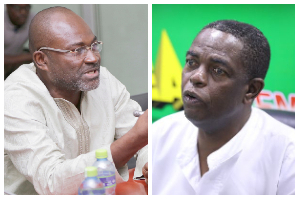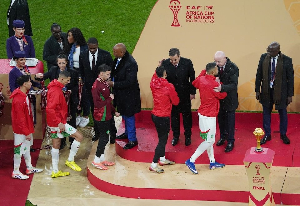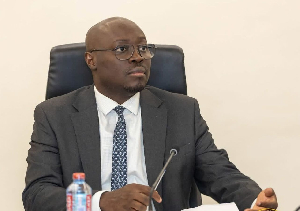By William Dowokpor J.P Kotter, a former Harvard Business School Professor, has defined leadership as the development of visions and strategies; the alignment of relevant people behind the strategies; and the empowerment of people to make the vision happen despite obstacles.
In Africa, consensus reached some three decades ago that the biggest challenge to the continent’s development is not resources but the lack of leadership still hold in even more profound ways.
Ghana, our beloved country is no exception when it comes to the dearth of leadership. Although it has been described as a beacon of hope on the continent for exhibiting ordinary democratic features such as holding elections every four years out of which two have resulted in regime change, since the promulgation of the forth republican constitution in 1992, it can not be said to have displayed leadership in a manner that would guarantee transformational development. In the last three weeks, three things have happened around the Presidency, to compel me to ask the President to put forth his vision for Ghana.
First, was the state of the nation address, titled “opportunities for all”, where the President failed to cast a clear vision with supporting strategies for its attainment. Second, was 2013 financial plan presented to parliament on behalf of the President, under the theme “Sustaining Confidence in the Future of the Ghanaian Economy” in that plan, the President failed yet again to share his vision for the country.
Third, was his speech to mark Ghana’s 56th independence day anniversary, which he opened, eulogizing Osagyefo Dr. kwame Nkrumah, first President of Ghana for his visionary leadership; but failed to share his own vision for Ghana on that auspicious day as current leader.
Why the Vision:
No nation since the last century has developed without a clear vision, whether it followed a capitalist property owning strategy, socialist, social democratic or a centrist progressive pragmatist one. "Where there is no vision, the people perish" - says the good book in Proverbs 29:18. My ideal leaders: Osagyefo Kwame Nkrumah of Ghana, Lee Kwan Yew of Singapore and Mahathir Mohamad of Malaysia, to mention just a few, are all visionary leaders. Their success stories are in the literature for all to read. In the late 1950s and early 60s Ghana, Singapore and Malaysia were all start-up nations. Their leaders had visions which they shared and implemented with a sense of urgency. They were engaged in a race to development. This mind set of a race to development was the driving force shared by majority of their people. It informed their conduct wherever they found themselves and it propelled them to success.
Unfortunately we have not seen leadership inspire, mobilize and empower Ghanaians around a common vision and credible development strategy since Nkrumah. How come Ghana was the most endowed among the three nations I have referred to, but remains the least developed today, even at the mature age of 56?
In 1960 Nkrumah developed a vision for Ghana. In the forward to Ghana’s Seven Year Development Plan 1963/64 – 1969/70, he shared the vision as follows “Our aim is to establish in Ghana a strong and progressive society in which no one will have any anxiety about the basic means of life, about work, food and shelter; where poverty and illiteracy no longer exist and disease brought under control; and where our educational facilities provide all the children of Ghana with the best possible opportunities for the development of their potentialities” It is an under statement to say, we have failed to attain the vision; when in the year 2013, we are praying and believing God to provide us with reliable water and electricity supply.
In the 4th republic, which is 20years old; and just enough time to develop if we had had leadership, we have had two documents purported to be long term national development plans, labeled as visions. One need not go beyond the titles and timelines of the documents to know they were mere wishful papers put together to meet the criteria for donor support. President Rawlings’ Vision 2020 and his successor, President Kufuor’s Vision 2015, were mere dreams that lacked the supporting strategies such as creating the enabling environment, mobilizing the people behind the vision and overcoming the challenges of dismantling and replacing the status quo to make the vision a reality.
The only way Ghana can see the kind of development we need is for leadership to be there. And this must not be alien to President Mahama. He must be familiar with Big Hairy Audacious Goals (BHAG), the kind that transformed Singapore and Malaysia. The kind that at the corporate level, he recently contributed to, with the commissioning of the 10billion dollar Hope City project, envisioned by Ghanaian entrepreneur Roland Agambire.
The Strategies: While visions capture an ideal or better state in the future. It must necessarily be broken down into (specific, measurable, attainable, realistic and time-bound) S.M.A.R.T. goals. And this is where and why Ghanaians must be worried. Had the President developed and shared his vision, the 2013 budget would then have been informed by the strategies supporting the first measurable targets, to be built upon in subsequent budgets. Apart from the goals and targets, the right environment needs to be created for the vision to thrive. The people, institutions, cultures and attitudes constitute the environment.
The Ghanaian environment is not conducive for a long term vision. That is why succeeding governments have focused on how to win the next elections and not how to govern to deliver a virtuous cycle of sustained transformational development. It explains why the visions 2020 and 2015 gave way to the “Better Ghana Agenda” translated into the short medium term development strategies we have settled for. The cold matter of fact it that, Ghana will not develop on medium term plans. The earlier we start the long haul, the better for all of us.
To succeed, the environment requires reforms that will immediately confront and defeat corruption and wastage estimated at $3billion per year from the system. President Mahama must appoint an “additional” Attorney General to be solely responsible for public prosecutions. The current A-G can remain the President’s legal advisor and Minister of Justice. Without that, the President must forget about fighting corruption. He will be defeated like his predecessors. Other key reforms required for any national vision to succeed include the prevention of Members of Parliament (MPs) from heading Ministries and serving on boards of state enterprises and public corporations. At the local level, the electorate in the districts must determine; who become their District, Municipal and Metropolitan Chief Executives. These are urgent reforms that will indicate a new dawn has arrived with quick gains for all to have confidence in the governance process.
Mobilizing People behind the Vision:
In his Independence Day address, the President called for all to get involved. He said ““each and every one of us has a responsibility to make a meaningful and constructive contribution towards the growth and betterment of this nation”. Unfortunately, the President has not shared his vision and until that is done; he can not expect people to contribute to something they know nothing about. Nation building is a long term venture. Even with the right leadership and a clear vision, it takes at least one decade (10years) to demonstrate beyond all reasonable doubt that a new dawn has arrived. And it takes one generation or at least 20 years in the best case scenario for a nation such as ours to attain developed nation status. Forget about the statistically deceptive middle income status. Bearing in mind that the 1992 constitution would not allow one leader to stay in office for more than eight years, makes the ability and capacity of an envisioning leader to mobilize people behind the vision, a key success factor. In practical terms, should President Mahama agree to take up the challenge and envision Ghana in the next 20 years, he would need to get key stakeholders, not only political actors, civil society and the media involved, as is the standard these days. Industry and commerce must be included. Science, technology and environmental experts must be involved.
Trade unions and professional bodies; students, minorities and the marginalized in society must find a place in that desired future state of Ghana; to buy into it, own it and be prepared to work towards it, until it becomes a reality. Should there be a regime change occur, the vision would remain the national vision that any new leader would want to continue with similar enthusiasm.
Overcoming the Challenges:
We have watched our public institutions deteriorate into very weak and collectively corrupt systems. To address this challenge, the Office of the President must lead the way by example. The President, his staffers, the civil servants and public servants are vital for the success of any vision to transform this country. The efficiency and effectiveness must begin from there. The bureaucracy can be positively red but must be reliable and trustworthy for the attainment of the vision regardless of who the leader is. Increasing the public wage bill without measures for corresponding high productivity to maintain it; promoting big party interest over national interest, bad corporate governance as a result of square pegs in round holes, winner takes all and entitlement mentality among ruling party members are challenges leadership must be prepared to overcome. For a little country so divided by politics with weak governance institutions, one would expect to rely on civil society, academia and the media to serve as the conscience of society. Unfortunately, many of these institutions have “surrendered” their sovereignty and have become a true reflection of Ghanaian society. It is time these institutions realized how vital they are for any meaningful progress in this country and begin to live up to expectation.
From developed to recently developed countries that have elected to go the democratic way; good, transparent, inclusive, accountable governance have been key success factors. The least President Mahama can do in that direction besides the rhetoric; is to restore the almost defunct National African Peer Review Mechanism Governing Council (NAPRM-GC) Secretariat to play its good governance monitoring and reporting role in our governance system. The current governors need not be maintained, if the current administration is uncomfortable with them. But by all means, that APRM work must go on!
William Dowokpor is a member of the Progressive People’s Party (PPP) and a Senior Partner at Advocacy Communications.
Opinions of Monday, 11 March 2013
Columnist: Dowokpor, William














